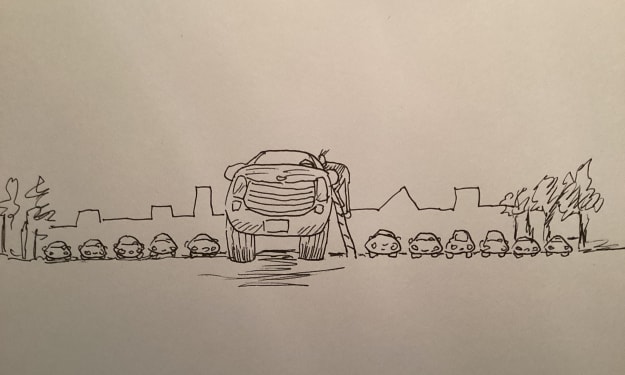Overcoming Our Worst Depression
Tools & Tips for Overcoming Tough Times

What a Depression can Cause to Our Health
Depression is a mental health issue that can cause a wide range of physical symptoms as well. Those with depression often experience fatigue, insomnia, changes in appetite, and a lack of energy. Left untreated, the most severe form of depression, known as major depressive disorder, can have serious consequences for overall health.
One of the most common physical side effects of severe depression is weight loss or gain. This is often due to changes in appetite and feelings of hopelessness or helplessness that can lead to disordered eating habits. For example, some people may lose interest in food altogether, leading to unintentional weight loss. Others may turn to food for comfort, leading to weight gain.
Depression also has a negative impact on sleep patterns. Those with depression often experience difficulty falling asleep or staying asleep. This can lead to fatigue during the day and can make it difficult to concentrate.
Severe depression can also lead to chronic pain. Studies have shown that individuals with depression are more likely to experience unexplained physical symptoms such as headaches, backaches, and muscle aches. This chronic pain can interfere with daily activities and contribute to feelings of hopelessness and helplessness.
Additionally, depression can increase the risk of heart disease. Studies have shown that those with depression are at a higher risk of cardiovascular disease and stroke. This may be due to the fact that depression leads to inflammation in the body, which can damage blood vessels and cause plaque buildup.
Finally, individuals with severe depression are at an increased risk of suicidal thoughts and behaviors. Those with depression may feel like there is no hope for their situation, and the only way out is to end their lives. It is important for those experiencing severe depression to seek help immediately if they have suicidal thoughts or behaviors.
In conclusion, severe depression can have serious consequences for overall health. Weight loss or gain, changes in sleep patterns, chronic pain, an increased risk of heart disease, and suicidal thoughts and behaviors are just a few of the potential side effects of severe depression. It is important for those experiencing depression to seek help from a healthcare professional as soon as possible to minimize the negative impact on their overall health.
The Effect of Drepression in Our Brain
It can have a profound effect on the brain, altering brain chemistry and leading to a range of symptoms that can impact a person's daily life. Understanding the effect of depression on the brain is important for both those who suffer from it and those who care for them.
One of the main ways that depression affects the brain is by altering the levels of certain neurotransmitters. These are chemicals that transmit signals between neurons in the brain, and they play a critical role in regulating mood, appetite, and sleep. In people with depression, the levels of neurotransmitters such as serotonin and norepinephrine are often lower than normal, which can contribute to feelings of sadness, anxiety, and fatigue.
Depression also affects the structure of the brain itself. Studies have shown that people with depression tend to have a smaller hippocampus, which is the part of the brain that plays a key role in memory and learning. This may help explain some of the cognitive symptoms of depression, such as difficulty concentrating and forgetfulness.
In addition to these effects, depression can also lead to changes in the way that different parts of the brain communicate with each other. This can result in an imbalance between different brain regions, which can contribute to symptoms such as negative thoughts and feelings of hopelessness.
Overall, the effect of depression on the brain is complex and multifaceted. It involves changes in brain chemistry, brain structure, and communication between different parts of the brain. Understanding these effects is an important step in developing effective treatments for depression and helping those who suffer from it to manage their symptoms.
How to Overcome the Worst Depression in Us
Depression is a serious mental health condition that affects millions of people worldwide. It can be difficult to overcome, particularly if you are experiencing the worst symptoms. However, there are ways to manage and recover from even the most severe depression. This article will provide some tips on how to overcome the worst depression in us.
1. Seek Professional Help
The first and most important step in overcoming depression is to seek professional help. This may be in the form of a therapist, psychiatrist, or counselor. A mental health professional can help you develop coping skills, identify triggers, and provide support and guidance throughout your recovery. They can also provide medication if needed.
2. Practice Self-Care
Self-care is an important part of managing depression. This can include getting enough sleep, eating a healthy diet, exercising regularly, and engaging in activities that bring you pleasure. It's also important to avoid substance abuse and other unhealthy behaviors that can worsen depression.
3. Connect with Supportive People
Depression can be isolating, and it's easy to feel alone and disconnected. That's why it's important to connect with supportive people, whether that's friends, family members, or support groups. These people can provide emotional support, a listening ear, and practical help when needed.
4. Challenge Negative Thoughts
Depression can lead to negative thinking patterns, such as self-blame, self-criticism, and hopelessness. It's important to challenge these thoughts and replace them with more positive and realistic ones. This may take some work, but it can help change your outlook and improve your mood.
5. Practice Mindfulness
Mindfulness is a technique that involves being fully present in the moment, without judgment or distraction. It can be helpful in managing depression because it can help you stay grounded and focused on the present. Mindfulness can be practiced through meditation, deep breathing exercises, or simply focusing on your senses.
6. Set Realistic Goals
Depression can make it difficult to accomplish even simple tasks. That's why it's important to set realistic goals for yourself, such as completing one small task per day. This can help you build momentum and start feeling better about yourself and your abilities.
Overcoming depression is not easy, but it is possible. With the right treatment, self-care, and support, you can manage your symptoms and start feeling better. Remember to be patient and kind to yourself throughout the process, and don't hesitate to reach out for help when you need it.
About the Creator
Enjoyed the story? Support the Creator.
Subscribe for free to receive all their stories in your feed. You could also pledge your support or give them a one-off tip, letting them know you appreciate their work.





Comments
There are no comments for this story
Be the first to respond and start the conversation.